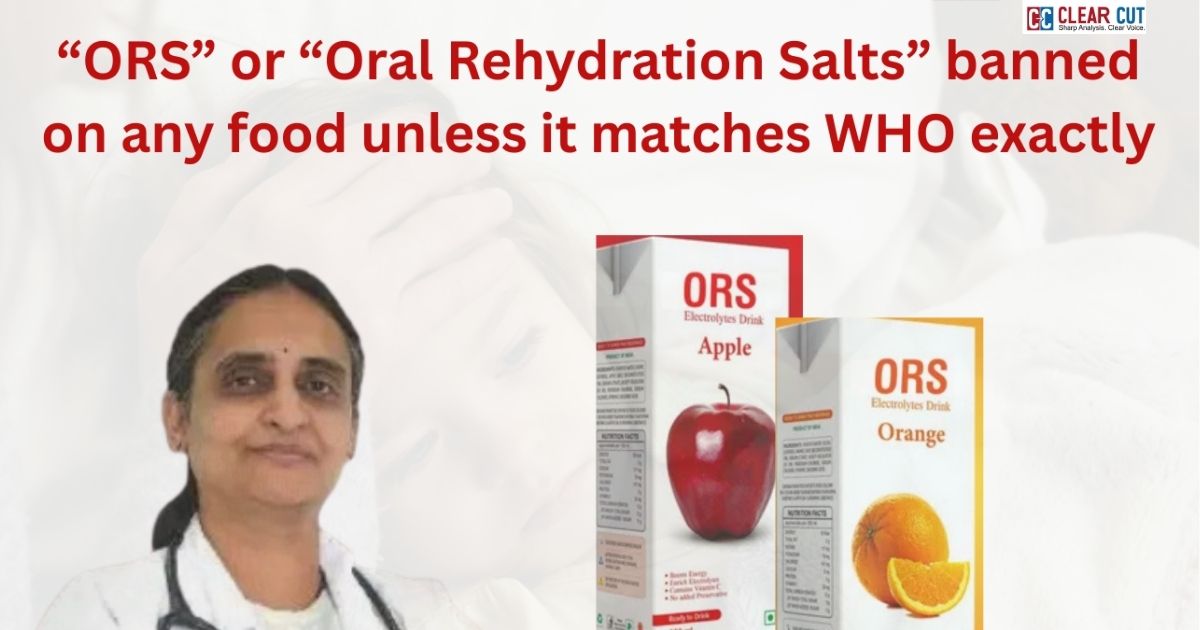Back in 1971, amid the chaos of Bangladesh’s fight for independence, refugee camps overflowed with families fleeing violence. Cholera swept through like a storm, dehydrating and killing thousands of children in hours. That’s when Dr. Dilip Mahalanabis, a pediatrician from Kolkata, made history. Working in those muddy camps, he whipped up a basic mix of salt, sugar, and water – drawing on 1960s research by scientists like Dr. Robert Phillips – to fight the deadly fluid loss. No needles, no hospitals needed. Just this oral rehydration solution (ORS) could revive a child on the spot. The World Health Organization locked in the formula in 1975, and today, it’s credited with saving over 50 million lives globally.
In India, ORS is a game-changer against diarrhea, the sneaky second-leading killer of kids under five. It strikes about 100,000 young lives here each year, often through simple dehydration from bad water or food. But ORS turns the tide: a packet stirred into a liter of clean water restores salts and fluids, slashing deaths by up to 93%. Government drives, like handing out free sachets at clinics, helped drop under-five diarrhea fatalities by 86% from 1980 to 2015. With one in five Indian kids facing diarrhea yearly, this cheap fix, at just a few rupees per dose, keeps heartbreak at bay for families across the country.
But imagine if that lifesaver got swapped for junk. That’s the fight Dr. Sivaranjani Santosh, a Hyderabad pediatrician, took on eight years ago. In her clinic, she watched parents rush in with limp toddlers, swearing they’d dosed them with “ORS” from the store. Instead of improving, the little ones got sicker. Bellies swollen, energy drained. These weren’t true ORS. They were sugary drinks in disguise, labeled “ORS Plus” or “Electrolyte Boost,” loaded with nearly 10 times the allowed sugar: about 120 grams per liter, including 110 grams of added stuff, versus the WHO’s strict 13.5 grams of dextrose. Electrolytes? A joke – 1.17 grams of sodium, 0.79 grams of potassium, and 1.47 grams of chloride, far from the gold standard of 2.6 grams sodium chloride, 1.5 grams potassium chloride, and 2.9 grams sodium citrate per liter, with a total osmolarity of 245 mOsm/L.
The excess sugar pulled even more water into the gut, worsening dehydration and blood sugar spikes. A nightmare for kids and diabetics alike. “These drinks made kids come in worse,” Dr. Santosh later said, her voice thick with the memories that sparked her war. Blame often fell on doctors when things went wrong, but she knew the real culprit: labels that tricked trusting parents into buying fruit-flavored poison.
It started quietly around 2017, with complaints to regulators. No response. So she amplified: social media blasts, alliances with pediatric and endocrine groups. In 2022, she filed a Public Interest Litigation in the Telangana High Court, slamming the sale of these fakes that ignored WHO rules and risked public health. The court, led by the Chief Justice, demanded answers from FSSAI and the Drug Controller General of India. That April, FSSAI stepped up with a ban on “ORS” labels for non-standard products. Hope surged.
Then the system buckled. Companies fired back with writ petitions, and by July 2022, FSSAI relaxed the rules, letting “ORS” stay in trademarks if paired with a weak disclaimer: “Not an ORS as per WHO.” It dragged on, extended in February 2024. The policy makers and other stakeholders were aware. But indifference ruled for four to five years. This wasn’t just red tape; it echoed deeper woes in FSSAI. Big food lobbies seemed to pull strings, prioritizing profits over pint-sized patients. “Three years of filing PILs, and four to five years of fighting indifference,” Dr. Santosh reflected.
She pressed on, fueled by a wave of support – doctors, lawyers, moms, influencers. On October 14, 2025, victory hit: FSSAI’s order yanked all prior permissions, banning “ORS” or “Oral Rehydration Salts” on any food unless it matches WHO exactly. No more loopholes for fruit drinks or sodas. A follow-up clarification on October 15 nailed it: such labels violate the Food Safety and Standards Act, 2006, by misleading with “false, deceptive” claims. Sell the fakes now? Face fines or worse.
Dr. Santosh’s Instagram erupted. Tears, hugs, raw joy. “It was a war. Eight years of battle… This victory belongs not to one person, but to people’s power, all the doctors, advocates, moms, and influencers who stood with me. I stood steadfast, and we won.” She even nodded to PM Narendra Modi for the push. It’s a shield for every parent mixing that sachet at 2 a.m., sure it’s safe. Real ORS, born in a refugee hell, stays pure. No more profit-driven dilutions.
This tale of one doctor’s dogged push lights up what’s possible. It guards a tool that could prevent countless kid deaths in India. But it hits hard too. Why does fixing something so basic take a courtroom marathon?
Think about it: In a nation where simple fixes could save lives, do we really need one exhausted hero to call out the scam, sue the system, and grind for eight years? Just so a mom can trust the drink that might save her child.
Clear Cut Health Desk
New Delhi, UPDATED: Oct 19, 2025 11:43 IST
Written By: Paresh Kumar




